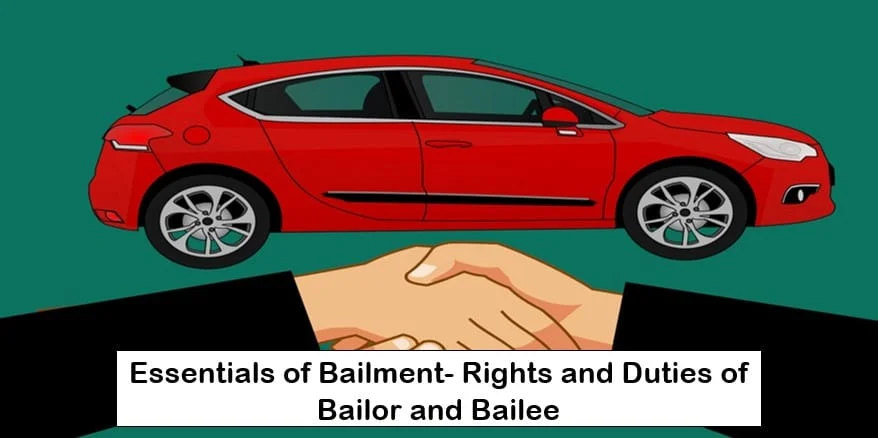

- A legally binding agreement (Valid contract)
Bailment is a unique kind of contract, as was previously mentioned. Thus, a contract must contain all of the necessary components in order to be deemed valid. The bailment must have all necessary components, including offer, consideration, contractual capability, intention, etc. In a court of law, the contract cannot be enforced in the absence of these necessary components. Nonetheless, among them, a bailment agreement may be legitimate without payment.
Two different kinds of bailments exist.
- Gratuitous bailment is defined as bailment made without thought.
- Non-Gratuitous Bail: Bail done with thoughtfulness.
- Transfer of ownership/Delivery of possession
The conveyance of commodities from one person to another is the most crucial component of a contract of bailment, as you will see from reading the definition of bailment. Section 149 of the Act states that “anything which has the effect of putting the goods in the possession of the intended bailee or of any person authorised to hold them on his behalf” may be used to deliver the goods to the bailee. There might be both constructive and real delivery of the items. Actual delivery denotes the transfer of the items from the bailor into the bailee’s physical possession. In a constructive delivery scenario, the items are impliedly given to the bailee through a few activities taken, rather than being delivered outright. It is crucial to remember that bailment requires the actual transfer of possession. An individual does not become the bailee just because you give him possession of the property.
- Delivery in accordance with the agreement
As previously stated, a contract between the parties must be made before the items can be delivered from the bailor to the bailee. The specifics of the goods’ return and transfer should be included in the contract. Nonetheless, the agreement may be “implied by the parties” or “expressly signed by the parties.”
An exception: Found lost property
A third party who finds lost property assumes the role of bailee of that property.
- The finder’s responsibility is to protect the goods.
- Don’t utilize these products for your own usage.
- Make the necessary efforts to track down the items’ true owner.
- Once the items are located, make sure they are handed to the rightful owner.
- The finder’s rights:
- To get payment for the costs and effort incurred in locating the owner and safeguarding the goods. (Part 168)
- If the products are perishable, then sell them.
- There was no sign of the owner.
- The owner or bailor of the items must, nevertheless, receive the proceeds of the sale. (Part 169)
- Purpose
The transfer of the commodities from the bailor to the bailee must have a clear goal in mind. The contract of bailment may be dissolved in accordance with Sections 153 and 154 if the bailee behaves inconsistently or uses the items without authorization. A contract’s specific purpose is crucial, and both parties must follow it.
- Return of goods
The bailee is required to return the commodities to the bailor once the intended use for them has been fulfilled. The terms of the contract or the bailor’s request shall determine the mode and manner of return. Section 160 states that “as soon as the time for which they were bailed has ended, or the purpose for which they were bailed has been completed, it is the duty of the bailee to return, or deliver according to the bailor’s directions, the items bailed, without demand.”





